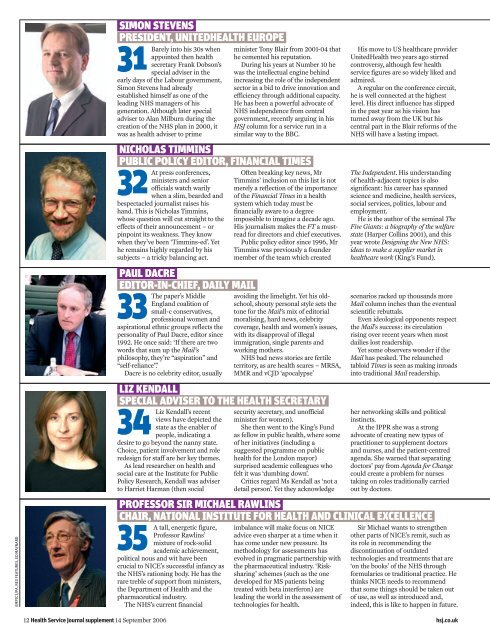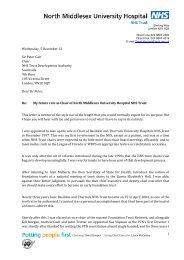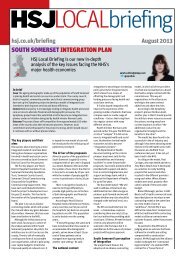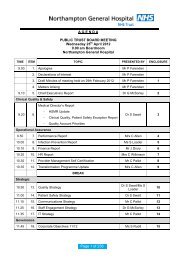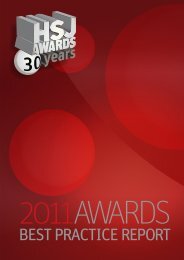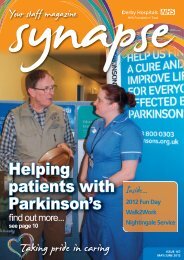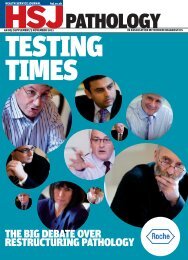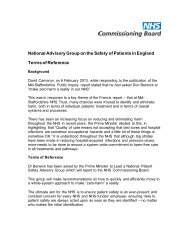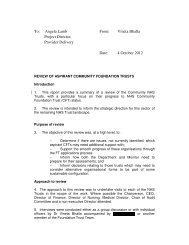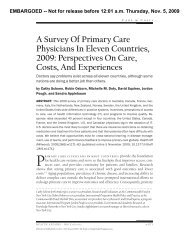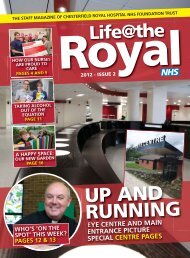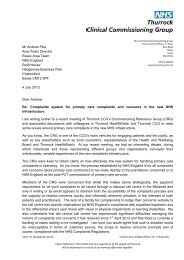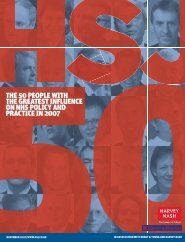HSJ50 2006 supplement - Health Service Journal
HSJ50 2006 supplement - Health Service Journal
HSJ50 2006 supplement - Health Service Journal
Create successful ePaper yourself
Turn your PDF publications into a flip-book with our unique Google optimized e-Paper software.
EMPICS/PA, REX FEATURES, ED MAYNARDSIMON STEVENSPRESIDENT, UNITEDHEALTH EUROPE31Barely into his 30s whenappointed then healthsecretary Frank Dobson’sspecial adviser in theearly days of the Labour government,Simon Stevens had alreadyestablished himself as one of theleading NHS managers of hisgeneration. Although later specialadviser to Alan Milburn during thecreation of the NHS plan in 2000, itwas as health adviser to prime32At press conferences,ministers and seniorofficials watch warilywhen a slim, bearded andbespectacled journalist raises hishand. This is Nicholas Timmins,whose question will cut straight to theeffects of their announcement – orpinpoint its weakness. They knowwhen they’ve been ‘Timmins-ed’. Yethe remains highly regarded by hissubjects – a tricky balancing act.33The paper’s MiddleEngland coalition ofsmall-c conservatives,professional women andaspirational ethnic groups reflects thepersonality of Paul Dacre, editor since1992. He once said: ‘If there are twowords that sum up the Mail’sphilosophy, they’re “aspiration” and“self-reliance”.’Dacre is no celebrity editor, usually34Liz Kendall’s recentviews have depicted thestate as the enabler ofpeople, indicating adesire to go beyond the nanny state.Choice, patient involvement and roleredesign for staff are her key themes.As lead researcher on health andsocial care at the Institute for PublicPolicy Research, Kendall was adviserto Harriet Harman (then social35A tall, energetic figure,Professor Rawlins’mixture of rock-solidacademic achievement,political nous and wit have beencrucial to NICE’s successful infancy asthe NHS’s rationing body. He has therare treble of support from ministers,the Department of <strong>Health</strong> and thepharmaceutical industry.The NHS’s current financialminister Tony Blair from 2001-04 thathe cemented his reputation.During his years at Number 10 hewas the intellectual engine behindincreasing the role of the independentsector in a bid to drive innovation andefficiency through additional capacity.He has been a powerful advocate ofNHS independence from centralgovernment, recently arguing in hisHSJ column for a service run in asimilar way to the BBC.NICHOLAS TIMMINSPUBLIC POLICY EDITOR, FINANCIAL TIMESPAUL DACREEDITOR-IN-CHIEF, DAILY MAILOften breaking key news, MrTimmins’ inclusion on this list is notmerely a reflection of the importanceof the Financial Times in a healthsystem which today must befinancially aware to a degreeimpossible to imagine a decade ago.His journalism makes the FT a mustreadfor directors and chief executives.Public policy editor since 1996, MrTimmins was previously a foundermember of the team which createdavoiding the limelight. Yet his oldschool,shouty personal style sets thetone for the Mail’s mix of editorialmoralising, hard news, celebritycoverage, health and women’s issues,with its disapproval of illegalimmigration, single parents andworking mothers.NHS bad news stories are fertileterritory, as are health scares – MRSA,MMR and vCJD ‘apocalypse’LIZ KENDALLSPECIAL ADVISER TO THE HEALTH SECRETARYsecurity secretary, and unofficialminister for women).She then went to the King’s Fundas fellow in public health, where someof her initiatives (including asuggested programme on publichealth for the London mayor)surprised academic colleagues whofelt it was ‘dumbing down’.Critics regard Ms Kendall as ‘not adetail person’. Yet they acknowledgeimbalance will make focus on NICEadvice even sharper at a time when ithas come under new pressure. Itsmethodology for assessments hasevolved in pragmatic partnership withthe pharmaceutical industry. ‘Risksharing’schemes (such as the onedeveloped for MS patients beingtreated with beta interferon) areleading the world in the assessment oftechnologies for health.His move to US healthcare providerUnited<strong>Health</strong> two years ago stirredcontroversy, although few healthservice figures are so widely liked andadmired.A regular on the conference circuit,he is well connected at the highestlevel. His direct influence has slippedin the past year as his vision hasturned away from the UK but hiscentral part in the Blair reforms of theNHS will have a lasting impact.The Independent. His understandingof health-adjacent topics is alsosignificant: his career has spannedscience and medicine, health services,social services, politics, labour andemployment.He is the author of the seminal TheFive Giants: a biography of the welfarestate (Harper Collins 2001), and thisyear wrote Designing the New NHS:ideas to make a supplier market inhealthcare work (King’s Fund).scenarios racked up thousands moreMail column inches than the eventualscientific rebuttals.Even ideological opponents respectthe Mail’s success: its circulationrising over recent years when mostdailies lost readership.Yet some observers wonder if theMail has peaked. The relaunchedtabloid Times is seen as making inroadsinto traditional Mail readership.her networking skills and politicalinstincts.At the IPPR she was a strongadvocate of creating new types ofpractitioner to <strong>supplement</strong> doctorsand nurses, and the patient-centredagenda. She warned that separatingdoctors’ pay from Agenda for Changecould create a problem for nursestaking on roles traditionally carriedout by doctors.PROFESSOR SIR MICHAEL RAWLINSCHAIR, NATIONAL INSTITUTE FOR HEALTH AND CLINICAL EXCELLENCESir Michael wants to strengthenother parts of NICE’s remit, such asits role in recommending thediscontinuation of outdatedtechnologies and treatments that are‘on the books’ of the NHS throughformularies or traditional practice. Hethinks NICE needs to recommendthat some things should be taken outof use, as well as introduced and,indeed, this is like to happen in future.12 <strong>Health</strong> <strong>Service</strong> <strong>Journal</strong> <strong>supplement</strong> 14 September <strong>2006</strong> hsj.co.uk


